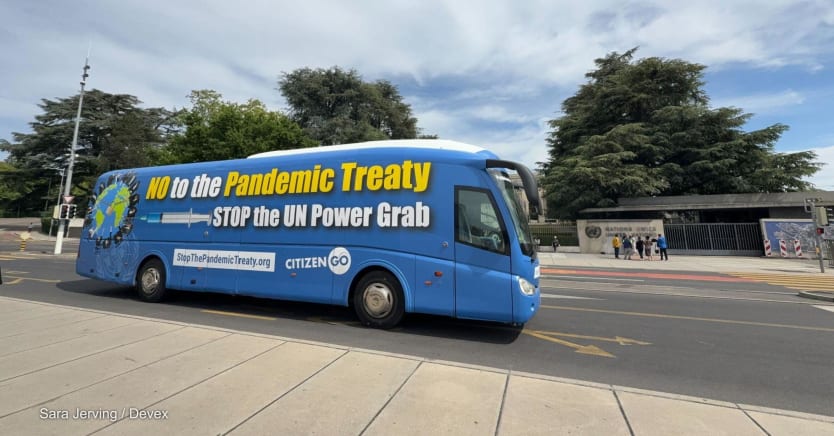
Standing outside the United Nations’ headquarters in Geneva on Monday was a group of protesters calling the pandemic treaty a handover of power to “globalist elites.”
They were from the conservative Spain-based advocacy group CitizenGo, and their bus, which called the treaty a “UN power grab,” circled around the city square where they stood.
World health leaders adopted the pandemic treaty on Tuesday at the World Health Assembly — the world’s highest annual forum for global health.
A leading concern of CitizenGo around the treaty is related to national sovereignty — a concern that is directly contradicted by the text of the accord, according to the World Health Organization. But the protestors and their concerns are emblematic of the challenges faced by the global agency in tackling crises that cross national borders.
The concerns seem to be shared by the U.S. government. On his first day in office in January, U.S. President Donald Trump ordered the secretary of state to “cease negotiations” on the treaty — saying that any “actions taken to effectuate such agreement and amendments will have no binding force on the United States.”

CitizenGo’s Sebastian Lukomski told Devex that his organization rejects efforts “to centralize global authority” in future pandemics and consider the treaty as an affront to their individual liberties and national sovereignty.
“We want our governments, who we elected, to call the shots in a time of crisis,” he said, adding that pandemic responses should be tailored to country contexts. “An outbreak of a disease in China is not the same as an outbreak of a disease in Italy.”
Landmark pandemic treaty adopted despite pushback by some countries
The treaty is designed to create a world better prepared for pandemics, ensuring a more equitable distribution of lifesaving medical interventions, a key challenge highlighted by the COVID-19 response.
In response to Devex’s questions about the protests, WHO said the draft pandemic accord explicitly says it doesn’t give WHO power over national governments.
“Nothing in the WHO Pandemic Agreement shall be interpreted as providing the Secretariat of the World Health Organization, including the Director-General of the World Health Organization, any authority to direct, order, alter or otherwise prescribe the national and/or domestic law, as appropriate, or policies of any Party, or to mandate or otherwise impose any requirements that Parties take specific actions, such as ban or accept travellers, impose vaccination mandates or therapeutic or diagnostic measures or implement lockdowns,” the text reads.
The accord also notes that its purpose is around ensuring “an effective, coordinated, appropriate, comprehensive and equitable international response, while reaffirming the principle of the sovereignty of States in addressing public health matters.”








